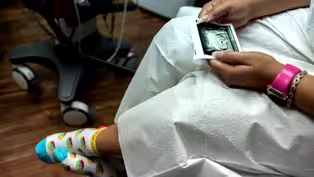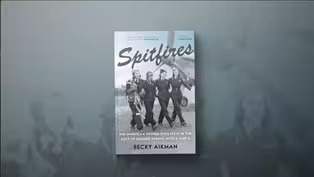
Why young adults finding themselves are lonelier than ever
Clip: 5/4/2025 | 6m 10sVideo has Closed Captions
Why young adults are lonelier than ever and what can be done to help
In a world where staying connected with family and friends can be as simple as tapping a button on your phone, many people are finding themselves lonelier than ever. It’s a crisis that is especially prevalent among young adults. Isabella Jibilian of Rhode Island PBS Weekly reports.
Problems playing video? | Closed Captioning Feedback
Problems playing video? | Closed Captioning Feedback
Major corporate funding for the PBS News Hour is provided by BDO, BNSF, Consumer Cellular, American Cruise Lines, and Raymond James. Funding for the PBS NewsHour Weekend is provided by...

Why young adults finding themselves are lonelier than ever
Clip: 5/4/2025 | 6m 10sVideo has Closed Captions
In a world where staying connected with family and friends can be as simple as tapping a button on your phone, many people are finding themselves lonelier than ever. It’s a crisis that is especially prevalent among young adults. Isabella Jibilian of Rhode Island PBS Weekly reports.
Problems playing video? | Closed Captioning Feedback
How to Watch PBS News Hour
PBS News Hour is available to stream on pbs.org and the free PBS App, available on iPhone, Apple TV, Android TV, Android smartphones, Amazon Fire TV, Amazon Fire Tablet, Roku, Samsung Smart TV, and Vizio.
Providing Support for PBS.org
Learn Moreabout PBS online sponsorshipJOHN YANG: In a world where staying connected with family and friends can be as simple as pressing a button on your phone, many are finding themselves lonelier than ever.
As Isabella Jibilian of Rhode Island PBS Weekly reports, it's especially prevalent among young adults.
TABITHA GRANDOLFO, Brown University Student: I was, like, so nervous to go.
ISABELLA JIBILIAN (voice-over): At 17, Tabitha Grandolfo moved from Hong Kong to Providence, Rhode Island to study at Brown University.
TABITHA GRANDOLFO: It was 2021, and there were COVID restrictions meant that if I wanted to go home, I would have to spend three weeks in a hotel in quarantine before I was able to, like, go back and see my family.
ISABELLA JIBILIAN (voice-over): Living far from home, she began feeling depressed and lonely, and she was trouble making friends.
TABITHA GRANDOLFO: I was in a play and I was really excited.
It was my first, like, play that I did on campus.
A roommate and a friend came to see it, and I came back after the show and like, they didn't talk about it at all.
And then the two of them went to some, like, party or after party and left me in the dorm alone.
I was just sitting there in my room alone folding laundry.
ISABELLA JIBILIAN (voice-over): By the time she returned to Hong Kong at the end of freshman year, her depression had become overwhelming.
TABITHA GRANDOLFO: I remember, like, not being able to get out of bed, and my mom was like, do you think you can go back?
ISABELLA JIBILIAN (voice-over): Stories like Grandolfo's are all too familiar to psychologist and Harvard lecturer Richard Weissbourd.
RICHARD WEISSBOURD, Harvard's Graduate School of Education: When people think of loneliness, they often think of senior citizens.
But in our data, the people who have the highest rates of loneliness are young adults.
They're people in their 20s and they're people in their 30s.
ISABELLA JIBILIAN (voice-over): Weissbourd conducted a national survey on loneliness during the pandemic and found that one in three Americans felt miserable levels of loneliness.
For young adults, the numbers were even higher.
About 60 percent felt that way.
Those statistics have improved since that time, but remain a worry.
ISABELLA JIBILIAN: What particular challenges do young adults face that you feel contributes to this high rate of loneliness?
RICHARD WEISSBOURD: People don't feel a sense of community at work.
They don't feel identity or purpose in work that they once did.
There's much less participation in religion among young people.
And religious communities are places where you're asked to think about your responsibility for people in your community.
We're much less likely to reach out to people who are lonely or to create the kinds of communities where everyone feels a sense of belonging.
ISABELLA JIBILIAN (voice-over): In 2023, the US Surgeon General warned that there was an epidemic of loneliness.
DR. VIVIEK MURTHY, U.S.
Surgeon General: And social disconnection is associated with an increased risk of not only depression, anxiety, and suicide, but also heart disease, dementia, stroke, and premature death.
ASHLEY KIRSNER, Founder, Skip the Small Talk: Loneliness is just as deadly as smoking an entire pack of cigarettes a day.
ISABELLA JIBILIAN (voice-over): Ashley Kirsner has spent much of her career studying the psychology of loneliness.
ASHLEY KIRSNER: One of the Trickiest things about loneliness is that the lonelier you are, the more negatively you see social situations, and therefore the less likely you are to yourself in social situations.
ISABELLA JIBILIAN (voice-over): Kirsner saw firsthand how damaging this mindset can be.
For two years, she volunteered at a suicide hotline in Boston, where she began to notice a pattern among the people who called in.
ASHLEY KIRSNER: No matter who I was talking to, they generally had someone who cared about them in their life.
But when I asked them, oh, have you talked about how you're feeling to that person?
Almost across the board, people would say, oh, no, we just don't talk about that sort of thing, or, no, I don't want to be a burden.
It just seemed like the determining factor of whether you were lonely or not was whether you felt comfortable opening up to those people.
I started asking, well, if the roles were reversed, would you want them to tell you about it?
And the answer was, without exception, oh, of course I would want them to tell me about it.
So I realized there was this weird gap between how vulnerable people were comfortable being and how vulnerable people wanted others to be with them.
ISABELLA JIBILIAN (voice-over): It gave her an idea.
She created an event she called Skip the Small Talk where people could get together and practice being vulnerable.
ASHLEY KIRSNER: Before I knew it, we sold out at 50 tickets weeks in advance.
It was supposed to be a three hour long event and I had to kick people out after seven hours because they wouldn't stop talking to each other.
ISABELLA JIBILIAN (voice-over): Skip the Small Talk has since spread to more than 20 cities across the country.
WOMAN: All right, you got about 30 seconds left.
30 seconds.
ASHLEY KIRSNER: I remember one thing people expected at the event where, oh, I thought I was the only one who wanted to talk about this more vulnerable, deep stuff.
And people were surprised to see that other people wanted to talk about it too.
ISABELLA JIBILIAN (voice-over): Talking about it was also important for Brown student Tabitha Grandolfo.
She worked with a therapist, took medication for her depression, and opened up to a friend.
TABITHA GRANDOLFO: I told her I was like, I don't know how I'm feeling.
I'm feeling really nervous.
And I was telling her all the reasons why, and she was like, we can create a routine together.
ISABELLA JIBILIAN (voice-over): Each morning she and her friend would eat breakfast and then walk to class together.
And each evening they came together to do homework.
WOMAN: Thanks for coming.
ISABELLA JIBILIAN (voice-over): She also got involved with a mental health advocacy group called Active Minds.
TABITHA GRANDOLFO: The first day I joined, they're like, we're looking for someone to do our graphic design.
And I was like, I'll do it.
ISABELLA JIBILIAN (voice-over): The group has a tradition of making friendship bracelets.
WOMAN: Everyone have their eyes closed.
ISABELLA JIBILIAN (voice-over): Each bead that's shared represents a positive quality the giver sees in the recipient.
Grandolfo has kept her bracelets from years past.
TABITHA GRANDOLFO: I have some others, too, but this one I feel like is special because it's the first one that I did.
ISABELLA JIBILIAN (voice-over): They're a reminder of the community she has found.
TABITHA GRANDOLFO: No matter what happens, I can go on a Wednesday evening and be able to see these people who are willing to, like, listen to me.
ISABELLA JIBILIAN (voice-over): Grandolfo is now a senior and plans to graduate this spring with degrees in psychology and theater.
For PBS News Weekend, I'm Isabella Jabilian in Providence, Rhode Island.
Family planning clinics lose funding over support for DEI
Video has Closed Captions
Clip: 5/4/2025 | 4m 21s | Family planning clinics lose Title X funding over statements supporting DEI (4m 21s)
How auto parts tariffs may affect new and used car prices
Video has Closed Captions
Clip: 5/4/2025 | 5m 2s | How tariffs on imported auto parts may affect car prices and repair costs (5m 2s)
News Wrap: Trump says he wants to continue mass deportations
Video has Closed Captions
Clip: 5/4/2025 | 2m 10s | News Wrap: Trump wants to continue mass deportations despite Supreme Court ruling (2m 10s)
‘Spitfires’ tells the story of American women pilots in WWII
Video has Closed Captions
Clip: 5/4/2025 | 5m 50s | ‘Spitfires’ chronicles the daring flights of American women pilots during WWII (5m 50s)
Providing Support for PBS.org
Learn Moreabout PBS online sponsorship
- News and Public Affairs

FRONTLINE is investigative journalism that questions, explains and changes our world.

- News and Public Affairs

Today's top journalists discuss Washington's current political events and public affairs.












Support for PBS provided by:
Major corporate funding for the PBS News Hour is provided by BDO, BNSF, Consumer Cellular, American Cruise Lines, and Raymond James. Funding for the PBS NewsHour Weekend is provided by...



